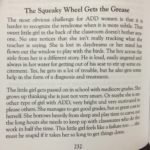Still reading “You Mean I’m Not Lazy, Crazy or Stupid?” – a book for and about adults with add. And this is all me, especially that last bit.
It’s sad there seems to be so many of us.
The things you see:
- She is a mess of papers. Trailing things, losing things, can’t find the homework she swears she did. Or turns in homework with ink stains, water stains, creases. Chew marks? Her shirt is on backwards or inside out.
- Her eyes drift, go glassy, she loses the thread of something she was saying in the middle of the sentence. She’s gone the moment you take your eyes off her.
- She writes and draws slowly, painfully. She can’t keep up with notes in class. Her hand cramps, so she massages it absently. Sports may be great or average, but these fine motor skills are still hard after years of practice.
- She wants to do better. She wants to. She always seems sincere. Sometimes she seems desperate. Always there’s a look in her eyes that says she knows she’ll fail but she’s going to try anyway.
- She has that thing somewhere. In her bag? Her locker? Where was it?
- You ask a simple question. She gives you a convoluted answer that is not what you were asking for at all but turns out, after a bit of a tangent, to be more accurate than you would ever expect from someone her age. It seems like an accident, but it happens just often enough to raise doubts.
- She always seems to be working on the task you were doing 5 minutes ago, not the task you’re doing now. She has no idea what task you’re doing now.
- Whenever she works on group projects, she has the biggest, grandest ideas and contributes the least amount of work to the finished product. Or she does the whole project herself and turns it in 3 days late. Or she has no idea what’s going on with the project and does her pieces incorrectly because she doesn’t know what the big picture is supposed to be.
- She can’t remember the multiplication tables. She can’t, no matter what you do to try to help her. The information won’t go in. (She has the presidents memorized in order, with their years and vice presidents.)
- She walks into the room, blinks at you, and says “I have no idea why I’m here.”
- She forgot the homework. It’s midnight, and her friend called 2 hours ago to kindly remind her that the big project is due tomorrow and she’s been working on it for 2 hours (it was supposed to be 2 weeks) and she’s crying and trying and her parent finally puts her to bed. She will get up in half an hour and start again, stay up until 4am trying to finish, not even sure what the requirements are because she can’t find the sheet but refusing to stop until she falls asleep on her desk.
- You ask her what she’s learned, and she can’t tell you. But in her head, her spaceship’s design is far more accurate now that she understands friction and propulsion and other things you weren’t actually trying to teach her. Or, you ask her what she’s learned and she can’t shut up about it, going on long after you’re very much Done with this conversation.
- She mastered this task last month, but now she has no idea where to start. Again. You go over it with her. Again. She gets through the first two steps and can’t remember what comes next. Again.
- She’s late. Again.
Things you don’t see:
- The world is a fascinating, beautiful, bustling, overwhelming place, and she will always be Not. Good. Enough. for it. She knows failure more than success. It’s no wonder she wants to be somewhere else.
- She often has insomnia because she can’t turn her brain off to sleep at night.
- The tiniest accommodations make it so she can breathe again.
- There is a place where she shines. It’s the athletic field, the music
room, debates, her kindness when she takes care of others, painting, her
fashion sense, hiking, telling stories. Somewhere, she shines. She
doesn’t think that means anything, though, because everywhere else she
is staggering through double gravity and wondering how everyone makes it
look easy.- She has no idea that she could shine everywhere – that it’s the rigid structure failing her, not her failing it.
- She is on another planet during 3rd period, literally, inventing a fictional language and a syllabary to go with it, and no one has noticed because they’re droning on about test prep.
- Sometimes she feels like an alien.
- When she’s fully here, in the classroom, she sees who else is struggling, like a kind of visible kinship. She could tell you who and why, but she won’t because you won’t ask.
- The day she finds out the bell curve was a eugenicist’s lie, she wants to burn the world down.
- It’s not an “active imagination” or “escapism” or a “fantasy life” – it’s self-care to fight depression and anxiety caused by being unable to meet the rigid expectations of an inflexible school system and society at large.
- She finally gets diagnosed in her 20s or 30s, after bringing her son in to the doctor to address his obvious ADHD. Going over the checklist in the waiting room, one hand absently snagged in the back of her son’s shirt to keep him from climbing the potted tree in the corner, she has a moment of stunning clarity: this is me.
* Note: There are boys and AMAB non-binary folks with non-hyperactive ADD as well, and we should not overlook them. Really, the only substantive reason to divide us into hyperactive and non-hyperactive is the structure of our school system and childcare, which mark hyperactivity as a behavioral issue to be addressed and everything else as just personality. Neither is accurate.
** This list is a conglomeration of experiences relayed to me anecdotally from several ladies of various ages and one dude. It’s not exhaustive or accurate for everyone.
Wow. Thank you. This, all of this is so true and I’m tearing up because it’s always a relief to know that you aren’t alone.


